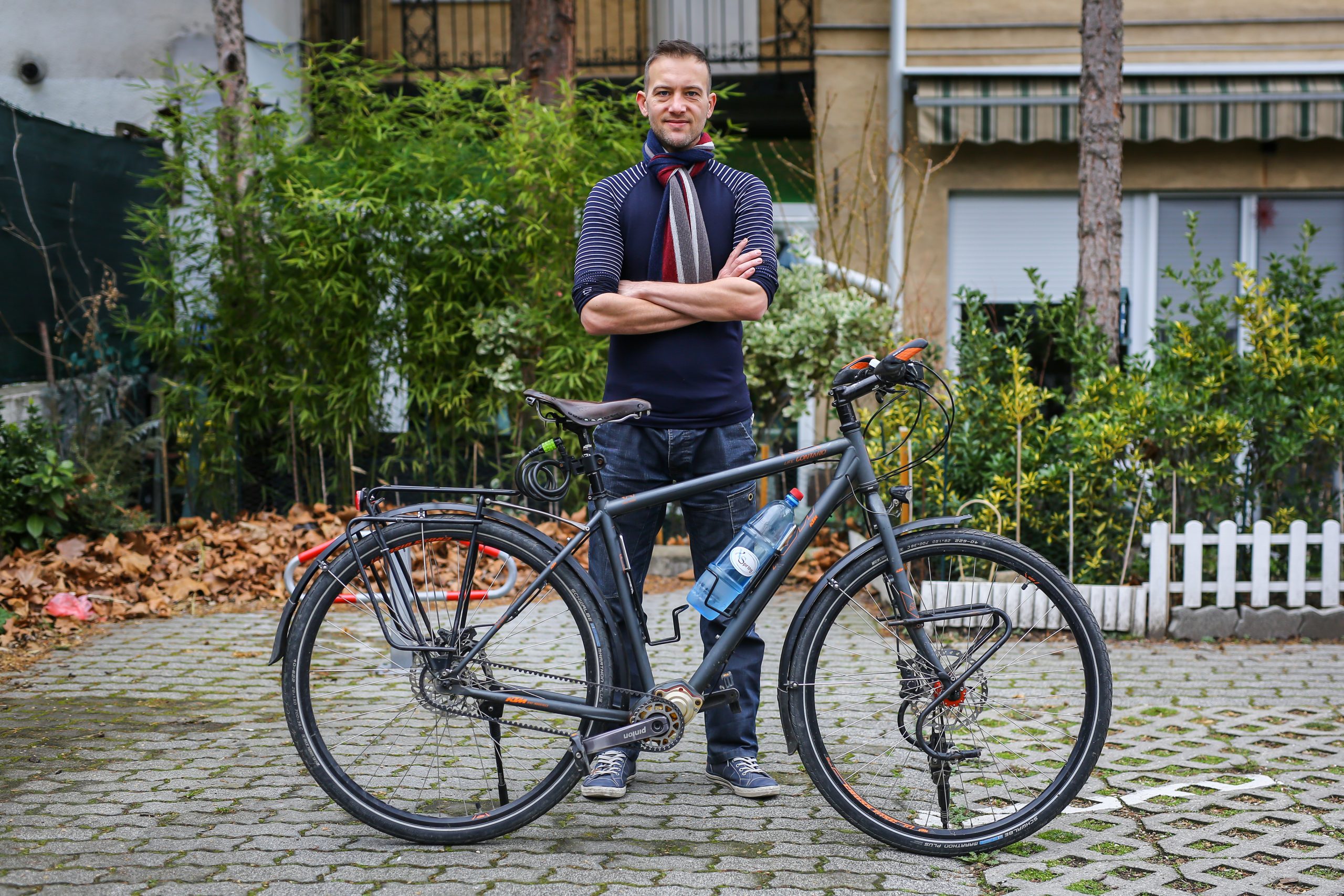
39 countries, 45,500 kilometers in 1,473 days, spending an average of 1,500 forints (EUR 4) a day. These are the main parameters of Adorján Illés’ cycling expedition around the world. Leaving behind a successful career as an engineer, he had to sell his belongings to be able to set off. However, it eventually proved to be an excellent decision, and not only did he gain a wealth of memories and experiences, but it seems that his thinking was also fundamentally changed by the four-year-long trip. Interview.
How did you decide to leave everything behind and set off to see the world on a bike?
Before, I was an engineer at a telecommunications company, I was having fun, making good money, learning a lot, but I felt I wasn’t fulfilling myself, I was fulfilling a company’s dreams instead of my own. So I thought I would like to do something that I both love doing and that creates value for people.
So in the summer of 2014, I quit my job and started doing motivational speeches, taking photos, and that’s when I realized that this is what I wanted to do.
The idea of the trip itself came a little later than that. A friend of mine came back from a bike trip in Europe in the autumn of 2014 and a few days later he brought up the idea, and I asked him if I could join. Then we rode together all the way to Malaysia, we went solo for a year, then reunited for five months from the USA to Mexico.
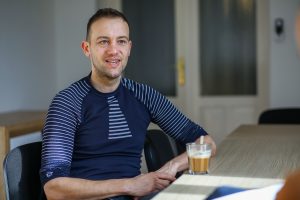
image by Attila Lambert/Hungary Today
How hard was it to leave everything behind?
I don’t think it was difficult, I was very attracted to it all and couldn’t wait to go. I met a girl two months before we left, but I told her honestly about my plans, so we played it straight. Anyway, we met her two years later in Indonesia and spent a week together.
To what extent was the trip an escape?
It didn’t feel like that at all. There’s a saying that good does not equal excellent, and that’s exactly how I felt about my life before I left. Anyway, I also felt that what I had been doing up to that point had little quality. For example, my job was to make sure that everyone could watch TV without any interruption. However, I consider TV to be brainwashing and I didn’t want to be part of the team that was assisting that.
How did you choose the direction?
We had been thinking for a long time whether to head east or west, and if I remember correctly, we finally decided to head east because of the weather. And the advice from a Hungarian cycling couple (Árpi and Zita) also helped us.
Maximum heat: 56 degrees (in Georgia), Highest point: 4,655 meters (Pamir, Tajikistan), -13 degrees in the tent.
What was your vision/concept before the trip?
People obviously feared for our safety. I had never done anything like it before, not even a one-day bike tour. So my idea was not to preconceive anything. I was more focused on getting ready and to tackle whatever life put in front of me and I was looking forward to getting going.
How long had you been preparing?
Although we were told that it takes about 1 year to do a trip like this, we completed it in about 5 months: we got the bikes, equipment, and visas. In addition, we found a bike shop in Csepel (Budapest’s 21st district) where we got a significant discount on the price.
And physically?
Well, probably not nearly as much as I should have. Although I had been working out constantly beforehand, I had hardly cycled any until the very beginning. So I suffered a lot in the first half a year.
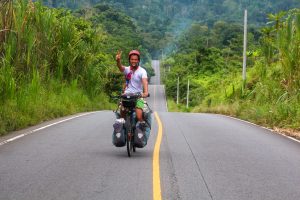
Riding in Panama. Image by Adorján Illés
A long journey like that is usually very expensive. How were you able to cover the costs?
Luckily, I got severance pay after I quit, but I also had to sell virtually all my belongings: carpets, furniture, washing machine, my piano and synthesizer. I used the money to buy my bicycle, equipment, and to pay for my first visas.
Once during the trip, I had a serious source of income: in Japan I raised about 1 million forints (EUR 2,670) from donations from the distribution of my travel photos. Actually, I got to love Japan so much that I even changed my flight for a more expensive one just to make the most out of my 90-day tourist visa.
It must have been a pretty low budget. How did you keep from running out of money?
About 1,500 forints (EUR 4) per day. Obviously I didn’t always succeed, but I was trying to keep to it. Each country had its own tricks. In Australia, for example, everything was obviously very expensive, but you could pick up a lot of still-edible stuff in the bins behind supermarkets, so I did a lot of dumpster diving. It’s a bit sad that people are wasting so much, but it came in handy for me.
Also, we did wild camping wherever we could, and it was easier to get free accommodation somewhere. Twice, in Bali and India, we even slept in jail cells in police stations, not as prisoners, of course, but that was where the police could give us a free spot to stay for the night. People were very accommodating in most places.
Did you have something like a mission?
One was planting trees. The original plan was that we would arrange for a sapling from each country to be transported on our bicycles to the next country and planted there. This was eventually modified so that we sourced trees locally and planted them with the locals. Eventually, we put about 60 baby trees in the ground around the planet.
The other was to photograph peoples’ smiles, which then grew to the Smile Book, of which I am now working on the English edition.
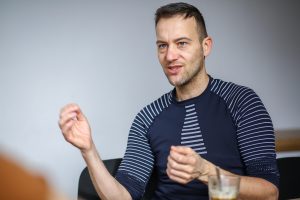
Image by Attila Lambert/Hungary Today
What were the biggest dangers along the way?
Vehicles often came very close on public roads and I had to pay very close attention not to get scared but to keep steering straight.
In terms of the weather, windstorms were perhaps the worst to deal with. Once in Australia during a rainstorm, I even had water flooding my tent, which was pretty scary.
And in Nicaragua, a civil war was about to break out right when I was there. The people were distrustful and in the cities you could feel the aggression, you could cut the tension. There was also a huge wind storm, so it was not an easy ride there.
Such long journeys are always an opportunity to learn about ourselves. What lessons did the journey teach you about yourself?
I think I learned to trust myself, trust life and be grateful, to focus on the positive. My attitude has become much more positive and I try even more to focus on what I have rather than what I don’t. I’m also much more aware, my awareness has perhaps expanded considerably, as I had to pay attention all the time on the road: to myself, to the route, to traffic, to budgeting money.
And what about the people?
Compared to what I had been warned about before the trip, about Iran and Pakistan, for example, people there were the nicest. What I found was that the vast majority of people were otherwise helpful and open. Obviously bad things do happen, but that is a thousandth of the reality and it is much safer to be here on Earth than many people would think, it’s just that a lot of the negative news is overstated and it makes you disenchanted. The question is what do you focus on: the bad or the good, lack or opportunity?
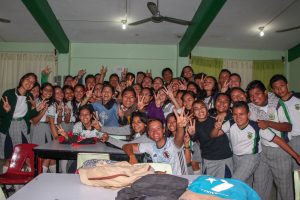
In a high school in Mexico. Image by Adorján Illés
Were you homesick?
Sure, I even cried a lot. I missed my parents, my brothers, sisters, and home most of the time.
What did you miss the most about Hungary?
Nothing in the beginning. But then I returned because I got too filled with experiences. Generally, I never stayed more than two nights in one place, although I did occasionally stop for longer periods. But then my “adventure tank” got full and I wanted to rest mentally, I wanted to be still. So in the end, after four years on the road, I was looking forward to coming home.
How open are we Hungarians to traveling?
Unfortunately, I think in general we are not so much of a traveling people these days. When I was twenty-something, traveling never came to my mind either; for example, I didn’t even do an Erasmus scholarship during university.
I also think that we Hungarians are more pessimistic. Especially in comparison to the people of Central and South America. However, I disagree with some of my acquaintances who, when I told them how easily I was provided with accommodation after a few minutes of conversation, said that this certainly wouldn’t be the case here. I think it could work here too, depending on the situation.
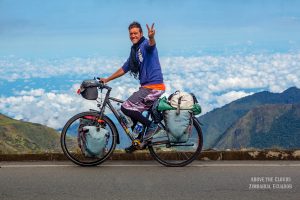
In Ecuador. Image by Adorján Illés
Have you found your place again at home?
I don’t think I will ever really “arrive.” I’m always on the go in my head. Also, I don’t want to and can’t fit into this society, for example, going back to work, sitting in front of a screen all day, pushing keys Monday to Friday.
Did you know before the trip that you were going to be a motivational trainer and coach afterwards?
No. I became interested in spirituality, success, and motivation meditation a few years before the trip. Then I realized that I also liked to talk about it, give lectures and training. And I also saw that I was helping people. I knew after the trip that I wanted to do something like that, but I didn’t have a picture. I knew I wanted to make my own dreams come true.
Is there a demand for it?
There is, but this is also something like a journey for me. And it all comes down to the mind, you have to reach for it, you have to realize that you can be a successful entrepreneur.
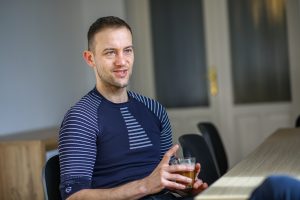
Image by Attila Lambert/Hungary Today
What message do you have for those who are considering starting up as well?
Traveling is one of the best teachers, one of the best things about it is that you get out of the loop. Whatever life you have, you probably have a system of what you do, when you do it, with whom you do it. And compared to that, going away, especially abroad, is such a special thing that you go straight into exploration mode. It’s very recharging. So my message is don’t think about it too much, just go for it, go!
Illés’s book, titled The Smile Book, has recently been published. You can find more info about it here.
featured image via Attila Lambert/Hungary Today